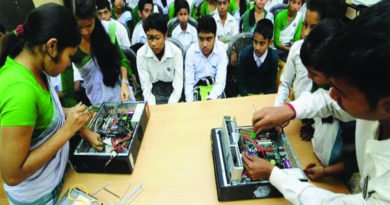Nilanjan Mukhopadhyay | Its not just about Rahul: The stakes are far bigger
The breath-taking alacrity with which Lok Sabha Speaker Om Birla moved to disqualify Congress leader Rahul Gandhi from the House makes it obvious that the BJP has concluded that his continuance as a Member of Parliament is hazardous to its political fortunes. Before going any further, it is necessary to examine the reasons for the ruling party and government wanting to rid the Lok Sabha of him. In the two decades in public life that Rahul Gandhi will complete next year, the longest stretch has been spent carrying the moniker of “Pappu”, or dim-witted youngster, affixed on him by the BJP, its leaders and social media amplifiers. The question that necessarily flows from this is simple: If the former MP from Wayanad is little but a daft apprentice, why this Kolavari Di, or murderous rage?
There are four points to take note of. First, Rahul Gandhi became a perturbing “problem” for the BJP because he began doing the “right” things since September last year. On the cusp of the first and second weeks of that month the one-time Congress president started walking from Kanyakumari on the Bharat Jodo Yatra, but was immediately met with scepticism: will he complete the yatra? Walking turned out to be the least of challenges despite an old excruciating pain in the knee resurfacing almost immediately and it required immense will-power and healing powers of a doctor to continue. In days, it was clear that Rahul Gandhi not only passed the endurance test to emerge as a challenger for the 56-inch crown for physical prowess, but was also getting messages of love, compassion and inclusiveness across to people. Prime Minister Narendra Modi once referred to torrential criticism directed at him and said he must doing something correctly to get the goat of his adversaries. Likewise, the Bharat Jodo Yatra and its lead yatri must have been spot on for it to be met by the BJP with ceaseless derision.
Yet, doubts remained — could that enthusiasm be sustained after the yatra? Furthermore, there were no immediate electoral gains for the Congress Party.
Despite rising mounds of doubts, the part-time politician of yore did not take a break and pointedly unscrambled in Parliament the nexus between Narendra Modi and the House of Adani. This criticism stung the BJP sharply — so much so that critical references in Rahul Gandhi’s speech were expunged from the Lok Sabha records. The third round of salvos was fired from London and it resulted in the unprecedented spectacle of the Treasury benches disrupting Parliament.
When Rahul Gandhi and the Congress, with the guarded support of several other Opposition parties, turned down the demand for an apology, the BJP realised that it was trapped in a one-way street. The only way to get Parliament back on track, or at least stop disrupting proceedings, and leave the Opposition to “do” this, was to physically remove Rahul Gandhi from the House. This could be done on a permanent basis only by disqualifying him. The champions of intimidation have from the beginning targeted individuals and set them as examples for others to see and realise the possible repercussions for falling foul of this government. The strategy has been deployed against a wide spectrum of professionals — from politicians to journalists. But in the process of evicting Rahul Gandhi from Parliament, permanently if he gets no judicial reprieve, the custodians of the largest democracy have ended up presenting evidence for the claims made by Rahul Gandhi in his London speeches: that Indian democracy has been systematically hollowed out already and autonomous institutions are now impartial only in name.
Second, Rahul Gandhi’s discourteous and extra-legal ouster has handed him and his party a tool that was consistently employed by the Prime Minister: victimhood, or playing the victim card. Among the factors behind Mr Modi’s emergence was his success in portraying himself as a wronged person or unlawfully attacked by multiple sections of society: adversaries in politics, civil society, academia, human rights activists, media/journalists and their collaborators outside India. The unprecedentedness of the action against Rahul Gandhi, from the filing of the criminal case on a matter that is traditionally treated as a civil issue, to the judicial process — including the stay sought, granted and vacated by the Gujarat high court, on the prayers of the primary petitioners, the BJP’s Gujarat MLA who is undoubtedly just a front man — provides the Congress and its leader an opportunity to convert this disqualification into a qualification for something much bigger than a Lok Sabha seat. The BJP’s worry is evident from false efforts to represent Rahul Gandhi’s speech as an instance of “bias” against OBCs. This preposterous charge is a symptom of grave apprehension within the BJP.
A third set of developments emerging from this have to be monitored in the coming months. The posture of non-Congress Opposition parties, especially those regional parties or satraps who haven’t firmed up alliances with the Congress, will have a bearing on the political landscape of next year’s parliamentary elections. The BJP’s strategy to single out Rahul Gandhi for attack will undermine the efforts of these parties to emerge as pivotal forces among Opposition parties. The immediate response of these parties and their leaders has been to close ranks and issue statements lending support to Rahul Gandhi and his party. At present, the proverbial momentum is undeniably with Rahul Gandhi for having rattled the BJP more squarely than he has done since 2014.
Fourth and last, the biggest challenge Rahul Gandhi faces is to ensure that the spotlight is shifted at the earliest from him and his disqualification. He has to impress upon people that this is not a battle for his political survival alone and instead there are bigger stakes for the people and the country. The legal process will be a long-drawn process but he will have redirect people’s concerns on misgovernance, livelihood issues, which include skyrocketing prices and the ceaselessly increasing unemployment rate. He will additionally need to forge consensus among non-BJP parties on issues flagged by him during the Bharat Jodo Yatra and are essential for an inclusive India. He will have to strike at the roots of the BJP’s politics of hate it has harnessed. The Congress and other Opposition parties long soft-pedalled the inherent dangers of Hindutva and failed to comprehend that playing along with Hindu majoritarianism will not enable them to emerge as alternative to the BJP. So far, Rahul Gandhi and the Congress have called a spade a spade, but this trait must be retained. It is also time other parties realise the need for similar ideological clarity. The parliamentary elections next year can well be the most polarised campaign in independent India.
By:




